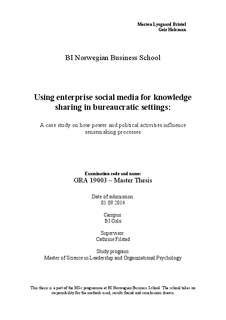| dc.description.abstract | In response to the call for more research on intra-organizational usage of
enterprise social media, and the insufficient addressing of how power effect
knowledge sharing in organizational life, this thesis adopts a sensemakingapproach
in order to capture power-dynamics that influence deployment of
enterprise social media-technology. The aim of the thesis is to explore how power
and political activities influence employee’s sensemaking processes for how to
utilize enterprise social media as an arena for knowledge sharing. Based on a case
study consisting of eight in-depth interviews conducted in a Norwegian public
sector organization, power and political activities are examined through (1)
managerial activities and (2) coworker influences. The authors find that vision and
goal setting, implementation and training issues, and top management and middle
management’s presence and engagement (or lack thereof) lead to divergent
sensemaking accounts for whether enterprise social media as a knowledge sharing
arena is accepted or resisted. This leads to a negotiation where employees mainly
adapt the system to fit with established practices. It is found that a lack of trust in
coworkers lead to people withholding contributions, and that discouraging
activities from a minority of employees augments interpretations of enterprise
social media as an unsafe and down-prioritized knowledge sharing arena – a topic
that warrants further investigation. Lastly, it is found that a perceived lack of need
to expand social networks in order to solve tasks reduce enterprise social media’s
role as a knowledge sharing arena. Accordingly, this thesis provides insights into
the largely unexplored area of how enterprise social media tools can facilitate for
knowledge sharing inside organizations. | nb_NO |
